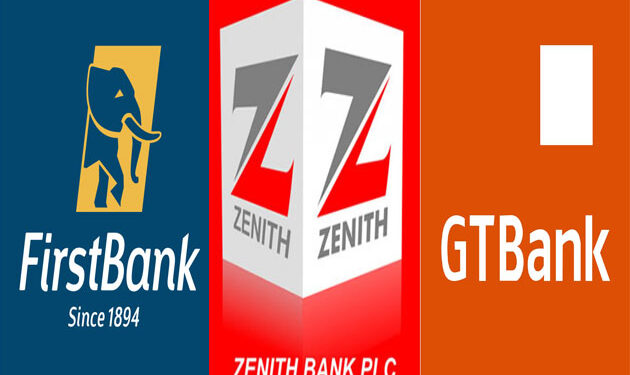* World Stocks Slip Into Red As Inflation, Earnings Loom Large
John Danjuma Omachonu
Earnings season for some shareholders, when they are expected to smile to the banks is around the corner as companies on the Nigerian Exchange Limited,(NGX) have started announcing board meetings and end-of-the-year closed periods in anticipation of the 2023 annual financial statements.
Ordinarily, shareholders would be happy as more money by way of dividend payout and other earnings would swell their accounts.
But, this time around cautious optimism is the watch word as bank owners and boards are wary of the ongoing investigations, fallouts of the report submitted by the Jim Obazee led special Investigation team.
This is even as some of the shareholders say, giving the present circumstances, the banks would have preferred to play low, and rather, plogh it back to justify bogus profits declared by some of them.
According to one of the bankers, “This is not the time to either meet or exceed shareholders expectations, but rather play the rules and be seen to be compliant on all fronts. We (banks) can think of other concessions or palliatives later, but the understanding and sacrifices must have to be shown by all parties now.”
However, global shares edged into the red on Monday and investors, wary of rate hike narratives, braced for U.S. inflation data and a corporate reporting season where robust results are needed to justify high valuations.
According to Reuters, geopolitical tensions were also on the radar as disruptions in the Red Sea raised shipping costs in Europe, while the Israeli conflict with Hamas threatened to spread to Lebanon.
European oil and gas stocks fell 1.8% (.SXEP) on the STOXX 600 as crude prices dipped following sharp price cuts by top exporter Saudi Arabia and a rise in OPEC output.
Oil prices , fell by more than 2% on sharp price cuts by top exporter Saudi Arabia and a rise in OPEC output, offsetting worries about escalating tensions in the Middle East.
There was more promising news from Washington where U.S. congressional leaders agreed on a $1.6 trillion spending deal aimed at averting a partial government shutdown.
Early gains during Asian trading vanished as MSCI’s broadest index of stocks (.MIAPJ0000PUS) slipped almost 1% after retreating 2.5% last week.
European stocks fell, extending their lacklustre start to 2024 weighed down by tepid energy shares, while a rise in government bond yields weighed on risk sentiment.
The pan-European STOXX 600 <.STOXX> was last down 0.3%, extending the previous week’s decline of 0.5%, while U.S. stock futures pointed to a weak open for Wall Street on Monday ,
Japan’s Nikkei (.N225) was closed for a holiday, while Chinese blue chips (.CSI300) lost 1.1% to hit near five-year lows.
The timing and scale of U.S. rate cuts remained in the driving seat.
“We foresee that continuing disinflation will eventually lead the Fed to reduce rates in May,” said Bruno Schneller, managing director at INVICO Asset Management.
“However, given the mixed signals from inflation data, policymakers are expected to hold off on easing measures until then.”
Data on Friday showed U.S. employers hired more workers than expected in December, dousing expectations of rapid easing of interest rates.
However, a survey from the Institute for Supply Management (ISM) showed activity in the services sector fell in December, pointing to a weaker economy.
The S&P 500 lost 1.5% last week to break a nine-week winning streak, its longest since 1989. The index’s 24% rally last year means valuations are looking a little stretched, so much is riding on the upcoming results season.
Major banks including JPMorgan Chase (JPM.N) and Citigroup <C.N> start the reporting rush on Friday with hopes high for upbeat profits.
Consensus forecasts are that S&P 500 profits rose 3% on the year with Goldman Sachs expecting higher results.
“The bar ahead of Q4 results is higher than in recent quarters, but we expect S&P 500 firms in aggregate will beat analyst forecasts,” Goldman analysts wrote in a note.
“Our baseline 2024 forecast is S&P 500 EPS (earnings per share) rises by 5% year/year, and we see potential upside from stronger U.S. economic growth, lower interest rates, and a weaker USD (dollar).”
Metrobusinessnews.com. com (MBN) checks show that should some banks and other quoted companies had their way, they would have opted for postponement ofthe board meetings and subsequent declaration of results within this period.
Some analysts think some board meetings might turn into ‘bored’ meetings that might degenerate into crisis.
But, part of the listing requirements on the NGX is that companies should declare their audited results to the investing public as of when due.
Consequently, some of the companies including, Access Holdings Plc, MTN Nigeria Communications Plc, Lafarge Africa Plc, Ecobank Transnational Incorporated, BUA Cement Plc, United Bank For Africa Plc and Zenith Bank Plc have notified the stock market communities of board meetings and closed periods.
For, instance, UBA, Group Company Secretary, Bili Odum in a signed notice said, “In line with the rules of NGX for quoted companies, UBA hereby informs its shareholders, NGX and the investing public that the Board of Directors of the Bank is scheduled to meet on Thursday, January 25, 2024, to consider, amongst other matters, the Group Audited Account and Financial Statements for the year ending December 31, 2023, as well as proposals for the Final Dividend.
“The results would only be published after receiving regulatory approvals. In compliance with the post-listing requirements of NGX for listed companies, United Bank for Africa Plc hereby declares the commencement of the closed period for trading in the Bank’s shares from Monday, January 1, 2024.
“Accordingly, no director, person discharging managerial responsibility, employee with sensitive information, adviser, and consultant of the Bank and their connected persons may directly or indirectly deal in the Securities (Shares and Bonds) of the Bank until 24 hours after the release of the Group Audited Accounts and Financial Statements for the year ending December 31, 2023, to Nigerian Exchange Limited,” the statement added.
Similarly, the company Secretary, Zenith Bank, Michael Otu in a signed statement said, “In line with the provisions of the Rulebook of the Exchange, 2015 (issuers Rules) Zenith Bank hereby informs its shareholders, the NGX, and the investing public that the board of Directors of the Bank is scheduled to meet on Wednesday, January 31, 2024, to consider the group’s audited financial statements for the financial year ending December 31, 2023. The board may also consider issues relating to other full-year dividends.
“Consequently, and in line with the amended closed period rules of NGX, Zenith Bank hereby declares the commencement of a closed period for trading in the banks’ shares from January 1, 2024, in respect of the 2023 AFS. The closed period will run until 24 hours after the 22023 AFS is released to the public.
“Accordingly, no insider and their connected persons may directly or indirectly deal in the shares of the Bank in any manner during the closed period. Kindly note that we are required to forward the 2023 AFS to the Central Bank of Nigeria (CBN) for approval of the release of the results on the floor of the NGX. We shall notify you of the decisions reached after the approval of the CBN is obtained.”
More worrisome for some banks is the part of the requirements which include strict adherence to high disclosure standards as prescribed in the NGX listing rules.
While NGX listing requirement mandates listed companies to submit their quarterly financial statement, not later than one month after the last day of the quarter, it also mandates companies to submit their audited annual financial statements not later than three months after the last working day of the financial year.
The implication is that most of these companies are expected to conclude the process by March ending when the accounts of the shareholders would be credited.
ALSO READ:Commendations As CBN Disburses $61m To Foreign Airlines To Settle Forex Backlog
The essence is to justify the heavy valuations on their shares and the fact that most of them declared billions in their profits, understandably, due to the devaluation of the Naira by the Central Bank, (CBN).
It was basically harvests of profits for those banks with offshore subsidiaries which benefited from the naira’s continued poor showing.
But, with allegations and counter allegations on the management and allocation of foreign exchange by CBN, particularly, under the former Governor, Godwin Emefiele, most banks are scared of being loud on their ‘impressive performances’ this time around.
Already, some of them, who had received letters of either invite or fx allocations since 2014, have started putting their documents together for scrutiny by the Economic and Financial Crimes Commission (EFCC).
Meanwhile the All share Index (ASI) of NGX as at noon on Monday was in positive with 0.32 percent with industrial, banking and consumer as leading Performers, sectorally.
The market activity saw total volume and value rising by 35 perfemt and 24 percent respectively, when compared to last Friday’s performance.












